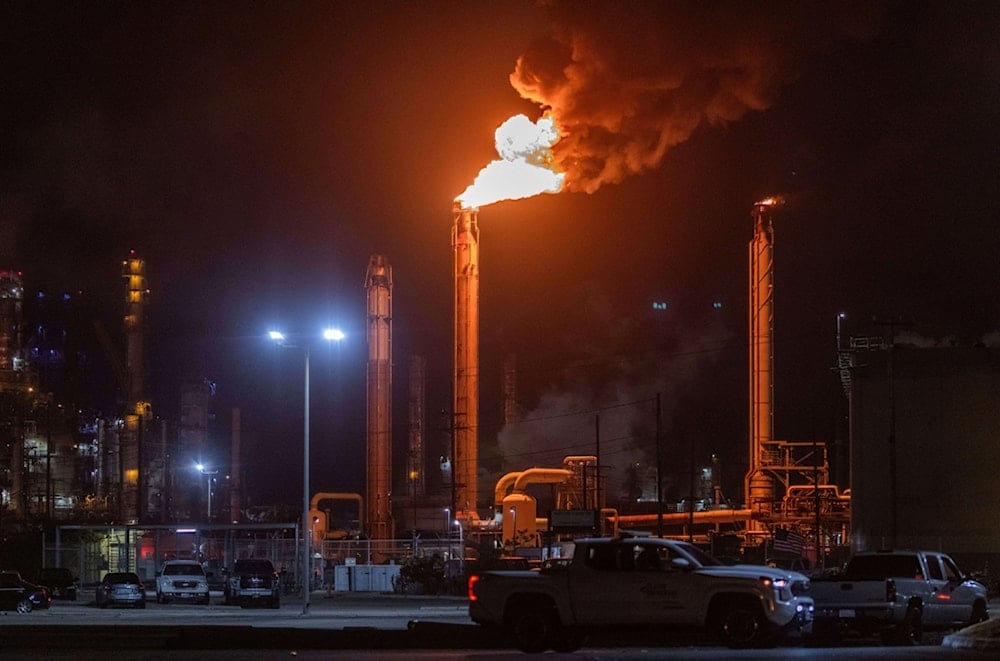Fossil fuel projects endanger 2 billion lives and ecosystems: Amnesty
A new Amnesty report warns that fossil fuel projects threaten 2 billion people and critical ecosystems, deepening the climate crisis and environmental damage.
-

Flames rise from the Chevron refinery in El Segundo, Calif., Thursday, October 2, 2025. (AP Photo/Ethan Swope)
A quarter of the global population, more than 2 billion people, lives within five kilometers of operational fossil fuel projects, placing them at heightened risk of serious health issues and environmental harm, according to a new report by Amnesty International shared exclusively with The Guardian.
The research, described as the first of its kind, identifies over 18,300 active oil, gas, and coal sites across 170 countries. These sites are concentrated in areas home to low-income and marginalized communities, turning vast regions into so-called “sacrifice zones” where the effects of pollution and toxic exposure are disproportionately felt.
According to the report, titled Extraction Extinction: Why the Lifecycle of Fossil Fuels Threatens Life, Nature, and Human Rights, nearly 463 million people, including 124 million children, live within one kilometer of fossil fuel infrastructure. An additional 135 million could soon face similar risks as 3,500 new fossil fuel projects are proposed or under development globally.
Read more: Environmental consequences of 'Israel’s' urbicidal war on Lebanon
Pollution and health risks near oil and gas facilities
The presence of fossil fuel infrastructure, such as drilling wells, pipelines, and processing plants, increases the risk of cancer, respiratory diseases, cardiovascular conditions, and premature death. Communities near these facilities also face declining air and water quality and land degradation.
The health and environmental toll of fossil fuel extraction, processing, and transportation is especially severe for vulnerable populations, including children, the elderly, and pregnant people. The report, citing UN experts, warns of multigenerational harm and calls for accountability from both governments and corporations involved in the oil and gas industry.
Beyond local health impacts, fossil fuel projects are accelerating the global climate crisis. A third of operational sites overlap with vital ecosystems, such as wetlands and forests, essential for biodiversity and carbon sequestration. The destruction of these areas not only undermines global climate targets but also threatens irreversible ecological collapse.
The findings come amidthe COP30 climate summit in Belem, Brazil, where leaders are under renewed pressure to commit to a fossil fuel phase-out. Notably absent is the United States, the world’s largest historical emitter of greenhouse gases.
Read more: Activists in 6 North Sea countries block access to oil infrastructure
Indigenous communities and biodiversity at risk
The report documents deep environmental injustice and racism, revealing that one in six fossil fuel sites is located on Indigenous lands, despite Indigenous peoples representing only 5% of the world’s population. Communities from Canada to Senegal and Colombia to Ecuador shared testimonies about the impacts of gas flaring, water contamination, land grabs, and threats against those who resist extraction.
“We physically won’t survive [this]... We have taken the brunt of all the violence,” said Wet’suwet’en land defender Tsakë ze’ Sleydo’ (Molly Wickham) in British Columbia, where new fossil gas infrastructure is planned on Indigenous territory.
In Brazil, fisher Bruno Alves de Vega spoke out against oil development in Guanabara Bay: “We are not after money; we only want what is ours... And they are taking our rights.”
Read more: WHO research shows 90% of Middle East air pollution from fossil fuels
Amnesty calls for urgent phase-out of fossil fuels
Amnesty International is calling on world leaders at COP30 to prioritize people over profits by committing to a full, fair, and fast phase-out of fossil fuels and a just transition to sustainable energy.
“The fossil fuel industry and its state sponsors have argued for decades that human development requires fossil fuels,” said Agnes Callamard, Amnesty’s secretary general. “But we know that under the guise of economic growth, they have instead served greed and profits without red lines, violated rights with near-complete impunity, and destroyed the atmosphere, biosphere, and oceans.”
The report also highlights the influence of fossil fuel lobbyists, revealing that over 5,350 industry representatives have had access to UN climate negotiations over the past four years. Meanwhile, countries like the Philippines, Mexico, and Jamaica are reeling from climate disasters made worse by fossil fuel-driven warming.
“The climate crisis is a manifestation and catalyst of deep-rooted injustices,” Callamard added. “The age of fossil fuels must end now.”
Read more: AI systems may devour 49% of data center energy by 2025, study finds

 4 Min Read
4 Min Read










